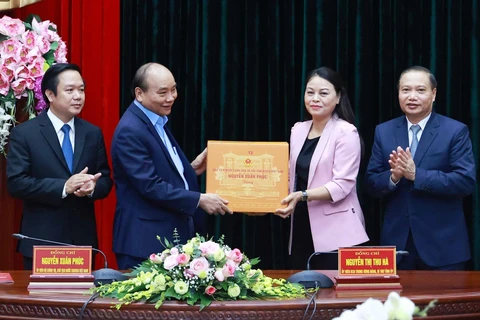Hanoi (VNS/VNA) - The key role of collectives in Vietnam's socialist-orientated market economy has been reinforced through the success of cooperatives up and down the country, though their further potential remains untapped.
The development of cooperatives was a key target of localities. In order to promote the local economy and overcome the ineffective operations of the current cooperatives, provinces focused on training workforce, mobilising financial sources and fostering administrative qualifications and management methods.
According to a report by the Vietnam Cooperative Alliance, by June 2021 there were over 26,000 cooperatives nationwide, of which more than 17,000 were agricultural cooperatives, over 7,000 were non-agricultural cooperatives and 1,100 were people's credit fund cooperatives with over 6.8 million members, creating jobs for over 2.4 million employees.
It is clear that the cooperatives have been participating in the One Commune, One Product (OCOP) programme, a national programme for Hunger Eradication and Poverty Reduction and the Programme of New Rural Development.
Many provinces have seen progress in the expansion of cooperatives.
Currently, Binh Thuan province has 201 cooperatives engaging in all economic sectors and fields with total capital of over 3 trillion VND (132 million USD) and over 50,000 members.
In the agricultural production field, more than 30 cooperatives are participating in linkage chains to organise production associated with the value chains, to create a larger volume of quality agricultural products and higher economic value.
Many products of these cooperatives have been recognised by the OCOP programme as provincial-level three and four-star products.
In particular, 25 people's credit funds, which are present in all communes and districts in the province, have played important role in actively supporting cooperative members in production and business activities, as well as contributing to the government to repel black credits.
However, Ho Cong Duong, Chairman of Binh Thuan province’s Cooperative Alliance, said that most cooperatives are small-scale with little capital and outdated equipment, and have not yet built a sustainable basis for operations.
Some cooperatives had not yet connected their members with the market, Duong said.
This leads to a very loose bond between the members and cooperatives, he said.
These are inherent limitations that the alliance had noticed and was looking for solutions to remove the shortcomings, Duong added.
Meanwhile, Nguyen Thi Minh Ngoc, Director of the Supporting Centre of Cooperative Alliance of Lam Dong province, said that product consumption was one of the most important service activities of the cooperatives in order to help members overcome the situation of 'good harvest, low prices', while alliances between cooperatives play an important role in supporting product consumption.
“The coordination between the departments, agencies, the alliance and the cooperatives is very important in bringing efficiency in the promotion, advertisement and consumption of products,” Ngoc said.
“In addition, the cooperatives and their members needed to realise the importance of linking members together and organising production and consumption of the value chain as well as helping members produce with co-operatives’ development drive,” she said.
According to Ngọc, the alliance should further promote cooperatives’ products via fairs, seminars and exhibitions.
Vo Thi Anh Hong, Chairwoman of the Cooperative Alliance of Tay Ninh province, said that the alliance needed to take advantage of capital from the National Target Programme on New-style Rural Area Building to coordinate with relevant agencies to build a new-style cooperative that promoted production associating with value chains and high technology application.
According to Thich Duc Thien, National Assembly (NA) delegate of Dien Bien province, for Vietnam's economy, in terms of size and the relationship between the production groups, the development of cooperatives is vital to solving the basic development issues of rural areas.
Developing the local economy and cooperatives is an effective lever to assisting the central economy, including the state's key economic groups, Thien said.
This was even more evident during the recent COVID-19 pandemic, he said.
“When the cooperatives paid attention to developing, they create a driving force for the country’s agriculture, including the development of organic agriculture, OCOP programme and hi-tech agriculture,” the NA delegate said.
The cooperative model is very suitable in rural areas and will promote the efforts and creativity of farming households, who are the owners of agricultural production activities.
These farming households will also receive effective support from cooperatives and thereby receive maximum support from the State via the National Target Programmes, Sustainable Poverty Reduction Programme, National Programme of New Rural Development and Socio-economic Development Programme in Ethnic Minority and Mountainous Areas, as well as being able to promote links with businesses and fully meet the requirements of international trade and economic integration.
However, there are also some shortcomings in developing cooperatives.
Most cooperatives operate on a small scale with little capital and poor management. This leads to weaknesses in setting up production and business strategies, especially in the period of international integration.
Therefore, fostering human and financial resources and updating management methods need support and investment from the State.
Nguyen Thanh Nam, an NA delegate of Phu Tho province, said that it is necessary to promote collective economic development with various forms of cooperation, though success should be built around cooperatives based on members' and collective ownership, and widely linking households to promote production and business to adapt to the new situation.
In order for the cooperatives to properly develop their role and promote the development of the household economy, the Government, both ministries and branches, should continue to pay attention to this area, including effectively implementing promulgated policies, especially those related to improving human resources for co-operatives, application of scientific and technology in production, investment, infrastructure development in agricultural production, and sustainable product consumption, Nam said./.
The development of cooperatives was a key target of localities. In order to promote the local economy and overcome the ineffective operations of the current cooperatives, provinces focused on training workforce, mobilising financial sources and fostering administrative qualifications and management methods.
According to a report by the Vietnam Cooperative Alliance, by June 2021 there were over 26,000 cooperatives nationwide, of which more than 17,000 were agricultural cooperatives, over 7,000 were non-agricultural cooperatives and 1,100 were people's credit fund cooperatives with over 6.8 million members, creating jobs for over 2.4 million employees.
It is clear that the cooperatives have been participating in the One Commune, One Product (OCOP) programme, a national programme for Hunger Eradication and Poverty Reduction and the Programme of New Rural Development.
Many provinces have seen progress in the expansion of cooperatives.
Currently, Binh Thuan province has 201 cooperatives engaging in all economic sectors and fields with total capital of over 3 trillion VND (132 million USD) and over 50,000 members.
In the agricultural production field, more than 30 cooperatives are participating in linkage chains to organise production associated with the value chains, to create a larger volume of quality agricultural products and higher economic value.
Many products of these cooperatives have been recognised by the OCOP programme as provincial-level three and four-star products.
In particular, 25 people's credit funds, which are present in all communes and districts in the province, have played important role in actively supporting cooperative members in production and business activities, as well as contributing to the government to repel black credits.
However, Ho Cong Duong, Chairman of Binh Thuan province’s Cooperative Alliance, said that most cooperatives are small-scale with little capital and outdated equipment, and have not yet built a sustainable basis for operations.
Some cooperatives had not yet connected their members with the market, Duong said.
This leads to a very loose bond between the members and cooperatives, he said.
These are inherent limitations that the alliance had noticed and was looking for solutions to remove the shortcomings, Duong added.
Meanwhile, Nguyen Thi Minh Ngoc, Director of the Supporting Centre of Cooperative Alliance of Lam Dong province, said that product consumption was one of the most important service activities of the cooperatives in order to help members overcome the situation of 'good harvest, low prices', while alliances between cooperatives play an important role in supporting product consumption.
“The coordination between the departments, agencies, the alliance and the cooperatives is very important in bringing efficiency in the promotion, advertisement and consumption of products,” Ngoc said.
“In addition, the cooperatives and their members needed to realise the importance of linking members together and organising production and consumption of the value chain as well as helping members produce with co-operatives’ development drive,” she said.
According to Ngọc, the alliance should further promote cooperatives’ products via fairs, seminars and exhibitions.
Vo Thi Anh Hong, Chairwoman of the Cooperative Alliance of Tay Ninh province, said that the alliance needed to take advantage of capital from the National Target Programme on New-style Rural Area Building to coordinate with relevant agencies to build a new-style cooperative that promoted production associating with value chains and high technology application.
According to Thich Duc Thien, National Assembly (NA) delegate of Dien Bien province, for Vietnam's economy, in terms of size and the relationship between the production groups, the development of cooperatives is vital to solving the basic development issues of rural areas.
Developing the local economy and cooperatives is an effective lever to assisting the central economy, including the state's key economic groups, Thien said.
This was even more evident during the recent COVID-19 pandemic, he said.
“When the cooperatives paid attention to developing, they create a driving force for the country’s agriculture, including the development of organic agriculture, OCOP programme and hi-tech agriculture,” the NA delegate said.
The cooperative model is very suitable in rural areas and will promote the efforts and creativity of farming households, who are the owners of agricultural production activities.
These farming households will also receive effective support from cooperatives and thereby receive maximum support from the State via the National Target Programmes, Sustainable Poverty Reduction Programme, National Programme of New Rural Development and Socio-economic Development Programme in Ethnic Minority and Mountainous Areas, as well as being able to promote links with businesses and fully meet the requirements of international trade and economic integration.
However, there are also some shortcomings in developing cooperatives.
Most cooperatives operate on a small scale with little capital and poor management. This leads to weaknesses in setting up production and business strategies, especially in the period of international integration.
Therefore, fostering human and financial resources and updating management methods need support and investment from the State.
Nguyen Thanh Nam, an NA delegate of Phu Tho province, said that it is necessary to promote collective economic development with various forms of cooperation, though success should be built around cooperatives based on members' and collective ownership, and widely linking households to promote production and business to adapt to the new situation.
In order for the cooperatives to properly develop their role and promote the development of the household economy, the Government, both ministries and branches, should continue to pay attention to this area, including effectively implementing promulgated policies, especially those related to improving human resources for co-operatives, application of scientific and technology in production, investment, infrastructure development in agricultural production, and sustainable product consumption, Nam said./.
VNA
























